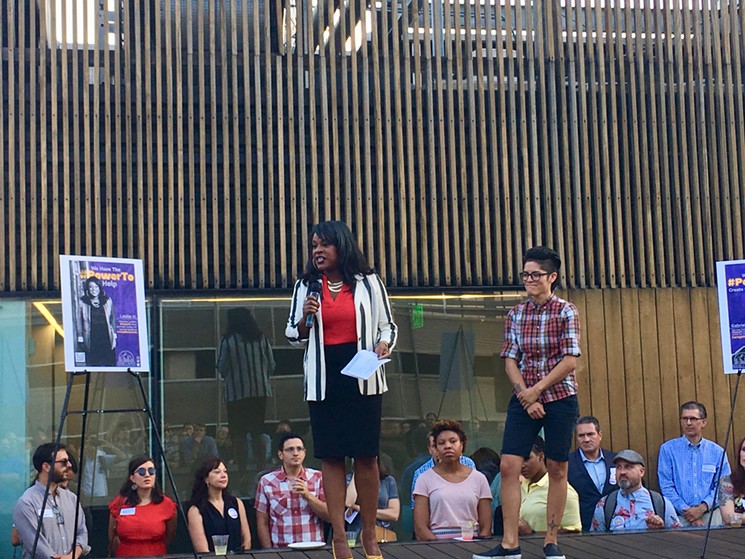For state representative Leslie Herod, tackling mental-health and substance-abuse issues is personal. Her sister has been in and out of jail for years, and Herod believes her troubles with the law largely stem from underlying mental-health issues.
In November, Denver voters will weigh whether to pass Herod's Caring 4 Denver ballot initiative, which would increase the sales tax by .25 percent, or about $45 million annually, to bolsters the city's existing mental-health and substance-abuse treatment options and fund suicide prevention programs and those targeting the opioid epidemic. (To put that amount into perspective, Mental Health Center of Denver works with a budget of around $100 million to treat approximately 60,000 patients per year.)
The initiative is also designed to "reduce homelessness, improve long-term recovery, and reduce the use of jails and emergency rooms."
"The largest mental health facilities are jails and prisons," Herod says. "I think this is the most important issue facing Denver today."
The initiative also calls for a new board to manage how the money is spent and stipulates that no more than 5 percent can be used for administrative costs.
A sales-tax increase would usually generate at least some partisan bickering, but the Caring 4 Denver initiative has the support of the state's highest law enforcer, who happens to be a Republican.
"I can tell you that the people that are suffering are not focused on what political party they are," says Colorado Attorney General Cynthia Coffman, who's signed on as a supporter of the initiative. "They just know that they need a place to stay, counseling, detox and a hand up to get out of a very unfortunate situation."
Mental health is one of the major issues facing not only Denver, but the country at large. The economic burden of major depressive disorders alone is $210.5 billion per year in the U.S., according to a 2015 study. But this initiative isn't about saving money: It's about saving lives.
"Leslie realized it was the right time because of three things: people are talking about mental health more, the opioid epidemic is in the news, and mental health in schools is a hot topic," says Dr. Carl Clark, CEO of Mental Health Center of Denver. "This amount of funding is a game-changer."
Herod says she thinks a sales tax is needed because funding for mental-health programs often comes behind essential city functions, such as infrastructure repair. "It's hard to get funding for Denver," she says. "People think we are over-resourced."
Denver would not be the first major city to adopt this kind of sales tax. King County, Seattle, has been collecting a .1 percent sales tax since 2008 for the same purpose.
[
{
"name": "Air - MediumRectangle - Inline Content - Mobile Display Size",
"component": "12017618",
"insertPoint": "2",
"requiredCountToDisplay": "2"
},{
"name": "Editor Picks",
"component": "17242653",
"insertPoint": "4",
"requiredCountToDisplay": "1"
},{
"name": "Inline Links",
"component": "18838239",
"insertPoint": "8th",
"startingPoint": 8,
"requiredCountToDisplay": "7",
"maxInsertions": 25
},{
"name": "Air - MediumRectangle - Combo - Inline Content",
"component": "17261320",
"insertPoint": "8th",
"startingPoint": 8,
"requiredCountToDisplay": "7",
"maxInsertions": 25
},{
"name": "Inline Links",
"component": "18838239",
"insertPoint": "8th",
"startingPoint": 12,
"requiredCountToDisplay": "11",
"maxInsertions": 25
},{
"name": "Air - Leaderboard Tower - Combo - Inline Content",
"component": "17261321",
"insertPoint": "8th",
"startingPoint": 12,
"requiredCountToDisplay": "11",
"maxInsertions": 25
}
]













